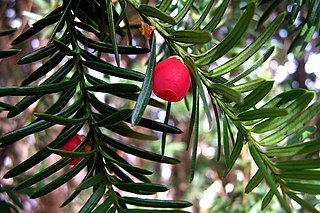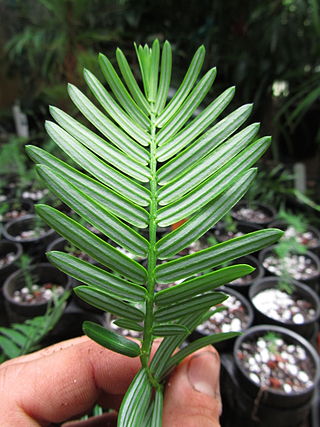
Taxaceae, commonly called the yew family, is a coniferous family which includes six extant and two extinct genera, and about 30 species of plants, or in older interpretations three genera and 7 to 12 species.

Robert Fortune was a Scottish botanist, plant hunter and traveller, best known for introducing around 250 new ornamental plants, mainly from China, but also Japan, into the gardens of Britain, Australia, and North America. He also played a role in the development of the tea industry in India in the 19th century.

Celtis is a genus of about 60–70 species of deciduous trees, commonly known as hackberries or nettle trees, widespread in warm temperate regions of the Northern Hemisphere. The genus is part of the extended Cannabis family (Cannabaceae).

Hibiscus rosa-sinensis, known colloquially as Chinese hibiscus, China rose, Hawaiian hibiscus, rose mallow and shoeblack plant, is a species of tropical hibiscus, a flowering plant in the Hibisceae tribe of the family Malvaceae. It is widely cultivated as an ornamental plant in the tropics and subtropics.

Camellia sinensis is a species of evergreen shrub or small tree in the flowering plant family Theaceae. Its leaves, leaf buds, and stems can be used to produce tea. Common names include tea plant, tea shrub, and tea tree.
Carya sinensis is a species of tree native to southwestern China and northern Vietnam, in the hickory genus Carya. It is sometimes called Chinese hickory or beaked hickory. It is closely related to Carya kweichowensis.

Cephalotaxus, commonly called plum yew or cowtail pine, is a genus of conifers comprising 11 species, either considered the only member of the family Cephalotaxaceae, or in the Taxaceae when that family is considered in a broad sense. The genus is endemic to eastern Asia, though fossil evidence shows it had a wider Northern Hemisphere distribution in the past. The species are evergreen shrubs and small trees reaching 1.0–10 metres (3–33 ft) tall.

Cephalotaxus mannii is a species of plant in the family Taxaceae. It is a tree up to about 20 metres (66 ft) tall, native to southern China, northeast India, Laos, northern Thailand, northern Myanmar and northern Vietnam. While the species is widespread, its populations are fragmented and it is threatened by cutting for timber as well as for using its bark and leaves for medicinal extracts.

Cephalotaxus griffithii, commonly called Griffith's plum yew, is a coniferous shrub or small tree in the family Taxaceae. It is native to northeastern India, northern Myanmar and western Sichuan in China. The species is named for the British botanist William Griffith.
Cephalotaxus hainanensis is a species of conifer known by the common name Hainan plum-yew. It is native to southern China, southeastern Tibet, and Myanmar, Thailand, and Vietnam in northern Indochina.

Cephalotaxus harringtonii, commonly known as Korean plum yew, Japanese plum-yew, Harrington's cephalotaxus, or cowtail pine, is a species of coniferous shrub or small tree in the family Taxaceae. It is native to Japan, but is occasionally utilised in western gardens and several cultivars exist for these purposes. Japanese plum yew has been in cultivation in Europe since 1829, and many modern horticulturists are familiar with this Japanese species, named in honour of Charles Stanhope, 4th Earl of Harrington, one of the first to grow the plant in a European garden, at Elvaston.

Cephalotaxus wilsoniana is a species of coniferous tree in the yew family, Taxaceae. Its common names include Taiwan plum yew, Taiwan cow's-tail pine, and Wilson plum yew. It is endemic to Taiwan, scattered in montane forests at altitudes of 1400-2700 meters. As Cephalotaxus wilsoniana is dioecious, and grows scattered with broad-leaved trees, the fecundity is not strong. In addition, the seed maturity period is very long. As germination and growth are also slow, Cephalotaxus wilsoniana is not commonly found.
Cephalotaxus latifolia is a coniferous shrub or small tree in the family Taxaceae. It is native to southern China and is similar in appearance to both C. sinensis and C. harringtonii.

Cephalotaxus oliveri, the Oliver's plum yew, is a coniferous shrub or small tree in the family Taxaceae. It is native to China and possibly to Thailand, Laos, Vietnam and eastern India.

The Chinese hare is a species of mammal in the family Leporidae. It is found in China, Taiwan and Vietnam.
Isoetes sinensis, the narrow quillwort, is a species of plant in the family Isoetaceae.

Etlingera maingayi, the Malay rose, is a species of herbaceous, perennial, flowering plant in the ginger family, Zingiberaceae. This species occurs in southern Thailand, where its flowers are eaten as vegetables, and Malaysia. It grows along forest edges and in disturbed areas.
C. sinensis may refer to:

Dipteronia sinensis is a plant species in the genus Dipteronia, endemic to mainland China, and regarded in the soapberry family Sapindaceae sensu lato after Angiosperm Phylogeny Group and more recently ), or traditionally by several authors in Aceraceae, related to the maples.
Tor sinensis, the Chinese or Red mahseer is a species of mahseer native to the Mekong River. It is known with certainty only from Yunnan, China; reports from Cambodia, Laos, and Thailand require confirmation.
It is one of four currently valid species described from China, the others being Tor laterivittatus, Tor polylepis, and Tor yingjiangensis.














